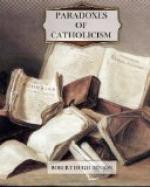III. Turn, then, to the life of her Lord for the solution of this riddle. Last week[1] He was going to His Death. He was losing, little by little, all that bound Him to Life. The multitudes that had followed Him hitherto were leaving Him by units and groups, they who might have formed His armies to seat Him on the throne of His father David. Disloyalty had made its way even among His chosen body-guard, and already Judas is bargaining for the price of His Master’s blood. Even the most loyal of all are dismayed, and presently will forsake Him and flee when the swords flash out in the garden of Gethsemane. A few weeks ago in Galilee thousands were leaving Him for the last time; and when, once again, a company seemed to rally, He wept! And so at last the sacrifice was complete and, one by one, He laid down of His own will every tie that kept Him in life. And then on Good Friday itself He suffered that beauty of His Face to be marred so that no man would ever desire Him any more, silenced the melody of the Voice that had broken so many hearts and made them whole again; He stretched out His Shepherd’s Hands with which alone He could gather His sheep to His Breast, and the Feet that alone could bear Him into the wilderness to seek after that which was lost. Was there ever a Suicide such as this, such a despair of high hopes, such a ruin of all ambition, a dying so complete and irremediable as the Dying of Jesus Christ?
[Footnote 1: This Sermon was preached on Easter Day.]
And now on Easter Day look at Him again and see how He lives as never before. See how the Life that has been His for thirty years—the Life of God made Man—itself pales almost to a phantom before the glory of that same Life transfigured by Death. Three days ago He fainted beneath the scourge and nails; now He shows the very scars of His Passion to be the emblems of immortal strength. Three days ago He spoke in human words to those only that were near Him, and limited Himself under human terms of space and time; He speaks now in every heart. Three days ago He gave His Body to the few who knelt at His Table; to-day in ten thousand tabernacles that same Body may be worshipped by all who come.
In a word, He has exchanged a Natural Life for a Supernatural in every plane at once. He has laid down the Natural Life of His Body to take it back again supernaturalized for ever. He has died that His Life may be released; He has finished in order to begin.
It is easy, then, to see why it is that the Church dies daily, why it is that she is content to be stripped of all that makes her life effective, why she too permits her hands to be bound and her feet fettered and her beauty marred and her voice silenced so far as men can do those things. She is human? Yes; she dwells in a body that is prepared for her, but prepared chiefly that she may suffer in it. Her far-reaching hands are not hers merely that she may bind up with them the broken-hearted, nor her swift feet hers merely that she may run on them to succour the perishing, nor her head and heart hers merely that she may ponder and love. But all this sensitive human organism is hers that at last she may agonize in it, bleed from it from a thousand wounds, be lifted up in it to draw all men to her cross.




